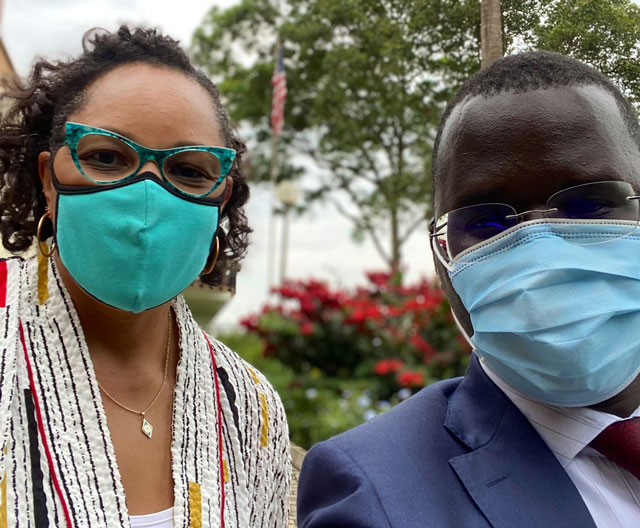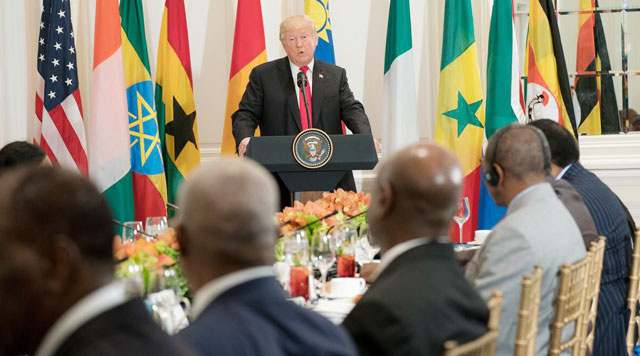
Mounting criticism
There has been a lot of criticism from the Ugandan opposition, media and civil society towards the U.S. for continually funding Uganda’s military which same military is used to brutalise members of the political opposition and their supporters in Uganda’s increasingly volatile body politic.
Museveni fresh off his sixth presidential election is under ever increasing pressure both at home and abroad for his brutal handling of dissent and wanton violation of human rights. More recently, Museveni, ordered his security forces to carry out arguably the most ruthless assault on the opposition after a Ugandan election.
In a televised address on Feb. 13, Museveni said some of the abductions were carried out by a highly trained commando unit brought in from Somalia. The president however used the term “forced disappearances” as opposed to abductions or kidnaps.
“We brought a distinguished commando unit from Somalia- which had also destroyed ADF rebels. This commando group quickly defeated the terrorists who wanted to disturb elections. They killed some and arrested some of these terrorists,” Museveni said.
Nicholas Opiyo, a human rights lawyer, himself abducted by security officers in December last year says there will be “consequences”. He was responding to a question by The Independent on the international implications of the unending abductions now entering their third month.
“Well there will be consequences for the individuals involved during and after the election,” Opiyo said.
He said with the current level of abductions and human rights abuses, Uganda becomes a “high risk country.”
“There will be consequences in some of these foreign capitals. When the dust settles…” Opiyo also said it is up to local actors to document all the ongoing abuses. “As local actors, we need to have an accurate account of these injustices which will enable the push for justice.”
Museveni’s main challenger in the election, Robert Kyagulanyi aka Bobi Wine, was arrested several times, his supporters jailed and tortured, some killed. Kyagulanyi spent days under house arrest after the election.
Weeks to the election, Ugandans were alarmed as scores of their relatives and friends went missing through abductions by security agents. On March 3, Kyagulanyi’s party, National Unity Platform (NUP) availed a list of those who have been abducted that had 243 names on it. Majority of these were supporters of Bobi Wine and agents of NUP.
Two weeks ago, on Feb. 22, the tensions were heightened again when Kyagulanyi declared that he had withdrawn his presidential election petition from the Supreme Court citing bias among the judges. He declared he was going to the court of public opinion.
As Kyagulanyi mulls his next move, the government and security forces are on standby ready to counter the singer-turned politician. With tensions brewing, Western diplomats and their home governments are also curiously wide-eyed on the political situation in Uganda.
On March 2, Museveni held a meeting with the UPDF High Command together with the Police leadership at State House Entebbe to discuss the security situation in the country.

Biden and Museveni
Museveni is two years younger than Biden but the two men’s political outlook could not be more different: Museveni clocked his 35th year in power on Jan. 26 and all his cards are now bent on political survival at all costs.
Biden is a longtime American politician whom the nation turned to for a time of national healing and consensus building after four years of Donald Trump stoking racial hatred, undermining his own government and insulting fellow leaders across the world.
Now Western political analysts say, the grandfatherly figure who came to office on the back of a strong repudiation of Trump must find a way of not abetting Trump like figures in the world if his promise is to have meaningful impact beyond American shores. A mob incited by Trump nearly impeded the transition of power in the U.S. in January in the nation’s capital.
Biden promised to have a democracy summit in mid-2021 that would serve as an olive branch signaling ‘America is back’.
It is not yet known what will transpire at the summit or which presidents will be speakers but it is expected to have a theme of restoring normalcy among the U.S. and its allies. But observers watching are wondering whether the likely to be high profile gathering won’t be another moment of political pageantry that liberal politicians in the West are known for.
When Biden was declared winner of the U.S. election in November, Museveni congratulated him and said he looked forward to more trade cooperation between the two nations mentioning the African Growth and Opportunity Act meant to provide market access to a variety of African manufactured goods.
Ofwono Opondo, the government spokesperson, told The Independent shortly before Biden was inaugurated that Uganda expects continued relations under a Biden presidency but added a caveat. “Uganda looks to continued good bilateral relations with new US administration under Joe Biden based on mutual respect and support.”
Opondo added that he expects Biden to improve multilateral relations through an improved UN system. Opondo who is always in testy back and forth statements with Western diplomats said he expects a prosperous world order “including efforts to open the U.S. market to Africa.”
****
 The Independent Uganda: You get the Truth we Pay the Price
The Independent Uganda: You get the Truth we Pay the Price



For latest African political news: https://www.africanpolicy.com
The US relationship with Saudi Arabia and Israel is one that typically defines US foreign policy. Saudi Arabia consistently ranks lowest in human rights (executions, ill treatment of women, no free press whatsoever, religious intolerance, disappearances and murders of critics – like Khassoghi, etc.). It also scores poorly on democratic governance (if that means elections and changing leaders every 5 years). Israel on the other hand continually commits crimes against the Palestinians reminiscent of South Africa’s apartheid regimes including land grabbing and constructing illegal settlements against international law, assassinations of “freedom fighters” using American weapons as well as air, land and sea blockages in the name of “Israel defending itself” against “terrorists”, etc. So it would be full hardy of any sane Ugandan to think this will change between Biden and M7. More financial and military assistance will flow in despite Kyagulanyi being tear gassed by substances procured from the UK, despite the over 50 protestors killed by US fire arms, etc. Basically, for as long as Al-Shabab exists and South Sudan is still a mess, M7 and the US will be feeding from the same breast!!!!